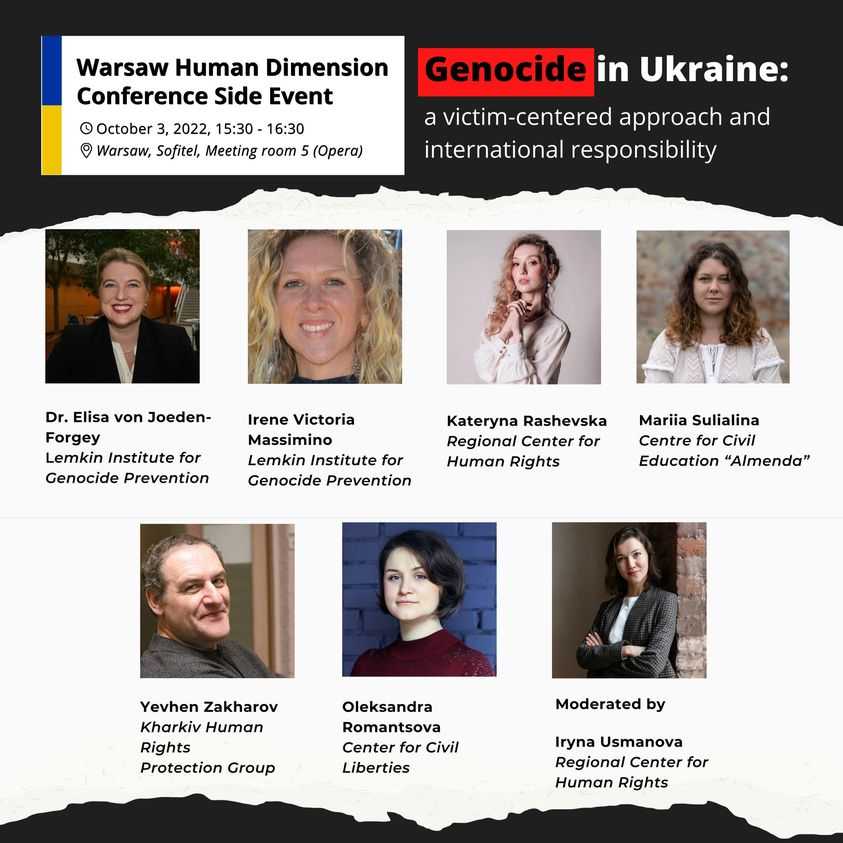Genocide in Ukraine: a victim-centered approach and international responsibility

On Monday, October 3, 2022, as part of the Warsaw Human Dimension Conference Center for Civil Liberties together with the Regional Center for Human Rights conducted a panel discussion on the topic: “Genocide and Accountability: Response of the NGO Community”.
The event was co-organized by: Lemkin Institute for Genocide Prevention, CCE “Almenda”, Kharkiv Human Rights Protection Group.
Since the large-scale invasion, more than 20% of Ukrainian territories came under Russian occupation. More than 1 million civilians were forcibly deported to the Russian Federation. Thousands of adults did not pass the Russian infiltration camps because of their ties to the Armed Forces and disloyalty to Moscow. Thousands of children are being deported to Russia, hundreds have allegedly been transferred to Russian families for foster care. Thousands of Ukrainians were killed, tortured, raped, castrated just because of loyalty to the Motherland.
During the side event, qualified international lawyers and public experts demonstrate why the mass atrocities of the Russian Federation should be qualified as genocide against the Ukrainian nation, outline the role of the international community in punishing the crime of genocide against the Ukrainian nation and provide a clear “action plan” for the OSCE member states to facilitate the adaptation of a victim-centered approach in bringing Russia and its top officials to justice.
Under the framework of the Convention on the Prevention and Punishment of the Crime of Genocide (CPPCG) and the Rome Statute genocide is any of five “acts committed with intent to destroy, in whole or in part, a national, ethnic, racial or religious group, as such.” These five acts were: killing members of the group, causing them serious bodily or mental harm, imposing living conditions intended to destroy the group, preventing births, and forcibly transferring children out of the group. Victims are targeted because of their real or perceived membership of a group, not randomly.
It is the first legal instrument to codify genocide as a crime, and the first human rights treaty unanimously adopted by the United Nations General Assembly, on 9 December 1948 (during the third session of the United Nations General Assembly.) The Convention entered into force on 12 January 1951 and has 152 state parties as of 2021.
The CPPCG was conceived largely in response to World War II mass atrocities crimes as the Holocaust that lacked an adequate description or legal definition. The term was coined by Polish-Jewish lawyer Raphael Lemkin, who genocide in 1944 to describe Nazi policies in occupied Europe and the Armenian Genocide.
Representatives of the Russian Federation, committing armed aggression in Ukraine, are committing war crimes and crimes against humanity almost every day. Attacks on the civil population, use of civilians as a human shield, forced mobilization, use of prohibited weapons, tortures, destruction of cultural heritage, and much more – these are not just acts of terrorism, as per classification by Ukrainian Public Prosecutor’s Office, these are international crimes with no statute of limitations on claims.
The Rome Statute grants the ICC jurisdiction over our main crimes: the crime of genocide, crimes against humanity, war crimes and the crime of aggression.
Ratification of the Rome Statute of the International Criminal Court is a step towards an effective investigation of crimes committed by the Russian Federation in Ukraine. Including the crime of genocide.
As of now, the Criminal Code of Ukraine does not define a list of international crimes, which are being committed by the representatives of the Russian Federation which will create substantial obstacles in holding the responsible people accountable.
The ratification will allow Ukraine to significantly accelerate the work procedures of the ICC.
Speakers:
Ms. Kateryna Rashevska, a legal expert at the Regional Center for Human Rights
Ms. Mariia Sulialina, program coordinator at the Center for Civil Education “Almenda”
Ms. Elisa von Joeden-Forgey, Co-President at the Lemkin Institute for Genocide Prevention
Ms. Irene Victoria Massimino, Co-President at the Lemkin Institute for Genocide Prevention, online
Mr. Yevhen Zakharov, Head of Kharkiv Human Rights Protection Group
Ms. Oleksandra Romantsova, Executive Director, Center for Civil Liberties
Moderator: Iryna Usmanova, Regional Center for Human Rights
During the event, the speakers discussed the problematic issues of the crime of genocide against the Ukrainian nation, namely: defining the stages of the crime of genocide; the role of Russian propaganda in the eradication of Ukrainian identity; forced deportations of Ukrainian children to the Russian Federation; the need for a victim-centered approach to justice processes; features of evidence of the crime of genocide on the territory of Ukraine since the full-scale invasion.
In order to respond to Russian war crimes, the participants of the event conducted an expert assessment of the events in Ukraine and prepared a number of practical recommendations for the competent authorities of foreign states and international organizations, which are aimed at bringing Russia to justice for the crime of genocide against the Ukrainian nation and other committing crimes.

